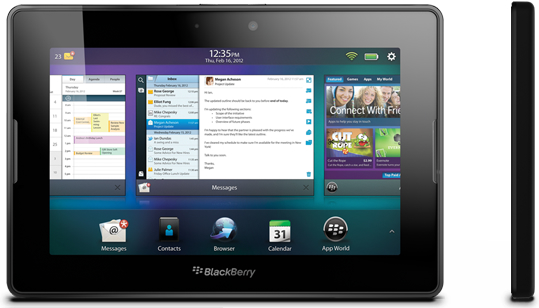4G LTE BlackBerry PlayBook -- only for die-hard RIM fans?

Even if I may not come across as a Research in Motion fan, I actually like the Canadian smartphone manufacturer more than you'd think. RIM is the underdog in the smartphone race and after I wrote the article on the new 4G LTE BlackBerry PlayBook I thought to myself "yeah, this is nice; I'd actually have one over a Nexus 7". The specs pointed to a very capable 7-inch tablet that is better than typical, run-of-the-mill, BlackBerry PlayBook in almost every single way. What's not to love about a new, strong entry on the market? Well…
I didn't expect to like the tablet, since I didn't expect it to be launched in the first place, given the financial context being most unfavorable in a long time for RIM. The 4G LTE BlackBerry PlayBook is a miracle in its own way, being released at a time when RIM shares plummeted harder than a Tic-Tac falling from a skyscraper. Then I saw the price: CAD549.95, in Canada, at Bell, Rogers and Telus; I'm still left wondering: "What are they thinking?" That's about $554 for the folks south of the Canadian border. Since both the Canadian and United States BlackBerry shops have the same prices for the PlayBook, it's fair to assume the 4G LTE BlackBerry Playbook will too.
The 32GB BlackBerry Playbook, the unpretentious RIM tablet, normally sells for $249 but it's discounted now to $229 in Canada and United States. An easy subtraction shows a $220-225 difference depending on currency (higher for US Dollar) and that could be reasonable if it was a wonder tablet, except it's not. That $550 for a 7-inch tablet is simply absurd when a 16GB Nexus 7 sells for less than half its price. Is the RIM 4G LTE BlackBerry PlayBook two times better than the 16GB Nexus 7? Take the LTE connectivity out and the hardware differences between the two do not favor RIM's tablet, except it has more storage. Are BlackBerry OS + 16GB of extra storage worth around $300 on top of the 16GB Nexus 7 price? It's not, at least for me anyway.
It's double the price of its most obvious competitor, but it's also $30 more than the 16GB Wi-Fi + 3G iPad 2 in the United States and the same price as the 16GB Wi-Fi + 3G iPad 2 in Canada. Between the two, I'd say more people will go for the iPad, despite it not having 4G LTE connectivity. I'm wondering if the guys who decided upon the price looked at other tablets on the market before setting the target on $550. Where I'm standing, it looks like an overpriced 7-inch tablet that's neck and neck on price with the iPad 2 and probably a bit less expensive than Microsoft Surface with Windows RT.
RIM stock traded for $7.17 per share at the time of writing the article on the announcement of the 4G LTE BlackBerry Playbook and from the looks of it the news of a new product isn't going to miraculously improve their market cap.
And it actually didn't do squat for the smartphone veteran. On August 2, when the story was published, RIM stock sold for $6.95 per share at closing time, worse than earlier during the day when I wrote it. On August 7, rumors of a partnership between RIM and Samsung surfaced and, coincidentally or not, the stock market rewarded RIM, which share price reached $8.34 on Monday. It's $7.44 in early trading today.
Simply put, RIM launched a new product, gaining little short-term benefit but when a rumor appeared of a possible partnership with Samsung the stock prices have suddenly improved. I'd venture a guess and say that the news of the 4G LTE BlackBerry PlayBook came like an alien landing in a deserted area: no one was there to see it, so it didn't make any difference.
So to answer my two questions from my previous article on the RIM 4G LTE BlackBerry PlayBook, I'd have to answer with "No" on both counts; it didn't influence stock prices, not for the better that is and I can only assume based on pricing that the sales of the Google Nexus 7 will not be disturbed by it.
Now, I'm not a pessimist by nature; I was actually optimistic about when RIM announced the new tablet, hoping that the underdog would fight off the bigger players. But when a sky-high price is added to the equation, the hardware and software combination don't shine even half as bright as almost two weeks ago. I still like the underdog, but I don't agree with its ways.
Now that the price has been set, who is interested in buying it? Not me.
